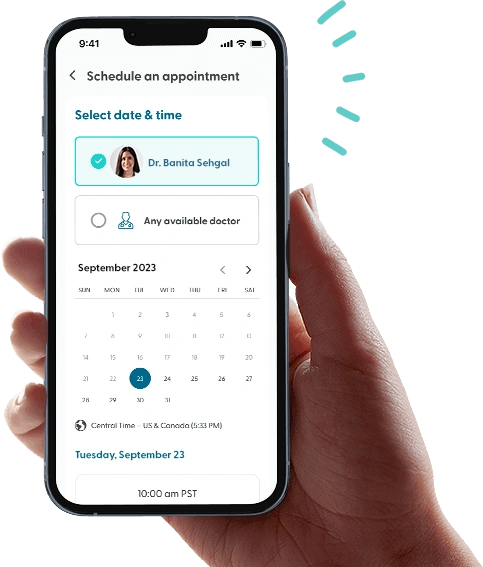An Essential Guide on Tightening Your Skin After Weight Loss

If you’ve been on a weight loss journey and have shed a significant number of pounds, it’s a big achievement that will greatly benefit your well-being.
However, the excess loose skin that may become visible during this process can be a frustrating side effect to manage.
Excess skin not only affects your appearance, but it can also cause physical discomfort and emotional distress.
If you’re concerned or self-conscious about excess skin, it’s important to learn how you can tighten it after weight loss to help you achieve a more toned appearance.
In this article, we’ll explore effective strategies you can use to improve skin elasticity and ensure you take proper care of your overall health.
Get prescription weight loss medication online.
Find out if you're eligible for GLP-1s, and get started on your weight loss journey.


What Causes Loose Skin After Weight Loss?
When you experience drastic weight loss, you may be left with excess loose skin that had previously expanded to accommodate those extra pounds.
Stretched skin from weight loss can damage collagen and elastin fibers — the compounds responsible for skin firmness. As a result, these fibers may not fully retract, leading to loose skin.
Losing a large amount of weight quickly also gives the skin less time to adjust and contract to fit your reduced body size.
Other factors that influence skin elasticity after weight loss
In addition to damaged collagen and elastin fibers, there are various other factors that can also contribute to excess loose skin following weight loss. These may include:
-
Length of time: The time it takes to lose weight may affect how well your skin can adjust to your body size. Rapid weight loss usually doesn’t often give the skin enough time to contract along with fat loss, which can result in looser skin. On the other hand, gradual weight loss gives the skin more time to adapt and retain its firmness.
-
Age: Age is an essential factor for skin elasticity. As we age, the body’s ability to produce collagen declines, which can cause loose skin. That’s why older adults are more likely to experience loose skin after weight loss compared to teenagers or children.
-
Genetics: Some people naturally have better skin elasticity than others. This can influence how your skin contracts after losing weight.
-
Sun exposure: Prolonged unprotected sun exposure can also damage collagen and elastin fibers, leading to loose skin. Wearing sun protection while outdoors can help preserve skin firmness and improve its ability to contract after weight loss.
-
Poor lifestyle habits: Certain lifestyle habits — such as smoking, excessive alcohol consumption, and poor nutrition — can negatively impact skin elasticity. These factors affect blood flow to the skin, which can impair collagen and elastin production.
How can excess loose skin impact your quality of life?
For some people, having excess loose skin can contribute to various challenges. These may include:
-
Emotional discomfort: The appearance of loose skin can be distressing and impact self-esteem. Some research indicates that loose skin can worsen self-consciousness after weight loss.
-
Physical discomfort during exercise: While losing weight may encourage people to be more active, having excess loose skin may interfere with some physical activities due to chafing. This can cause individuals to lose motivation to work out.
-
Skin irritation: Loose skin folds may rub against each other, resulting in chafing, irritation, and inflammation. This can cause discomfort that could negatively impact your daily activities.
How Can You Tighten Your Skin After Weight Loss?
Do more resistance training
Engaging in resistance training can be a great way to tighten loose skin. By building muscle mass, you may be able to “fill” the space left by lost fat and create a leaner appearance.
Exercises like weightlifting, resistance band workouts, and bodyweight exercises can help to improve muscle tone and overall body composition, contributing to firmer skin.
Try to aim for two to three resistance training sessions per week, alongside cardiovascular or aerobic exercises — like running or swimming.
Take a collagen supplement
Collagen is an essential protein for keeping skin firm, especially after weight loss.
Taking a collagen supplement — like a powder or capsule — can help increase the levels of this substance in the body and potentially reduce the appearance of loose skin.
Keep in mind that visible results from using collagen can take up to 12 weeks, so patience is essential.
Follow a nutrient-dense diet and stay hydrated
Consuming certain nutrients can help enhance collagen production and support overall skin health. These nutrients include:
-
Protein: Consuming adequate protein is vital for firm and healthy skin. The amino acids found in protein can increase collagen production while supporting muscle building to help you minimize loose skin.
-
Omega-3 fatty acids: These compounds — which are mainly found in fatty fish products or supplements — are essential for improving elasticity to support firmer-looking skin. Omega-3 fatty acids also have anti-aging properties, which can help the body increase collagen production.
-
Vitamin C: This vitamin is an essential compound that helps the body absorb and produce more collagen. A vitamin C deficiency can cause elastin fibers to weaken, which may lead to looser skin that doesn’t contract easily. Foods rich in vitamin C include citrus fruits, bell peppers, and broccoli.
-
Vitamin E: This vitamin is an antioxidant that protects the skin from oxidative stress that breaks down collagen fibers. You can apply vitamin E topically or eat foods high in this vitamin, such as nuts, seeds, spinach, and avocados.
-
Vitamin A: This vitamin is important for promoting skin cell turnover and regeneration, which helps maintain healthy, firm skin. It also helps repair damaged tissues and can prevent sagging skin. Vitamin A can be found in foods like carrots, sweet potatoes, and dark leafy greens.
-
Zinc: Zinc is important for guarding your skin from sun damage that can cause elastin fibers to break down. When these fibers are damaged, the skin can’t retain its firmness and appears looser. Good sources of zinc include meat, shellfish, legumes, seeds, and nuts.
-
Selenium: This is another antioxidant that helps protect the skin from free radicals. Selenium also enhances the production of glutathione peroxidase, which is an enzyme that helps the skin retain its elasticity. Foods high in selenium include Brazil nuts, seafood, and red meats.
While it’s important to follow a diet that contains these nutrients, you should also drink enough water.
Staying hydrated can help improve your skin’s appearance, and increasing your daily water intake has been shown to enhance elasticity.
Use firming creams
Firming creams with ingredients like retinol, peptides, and hyaluronic acid may help improve the appearance of loose skin.
These products work by stimulating collagen production and hydrating the skin, making it appear firmer and more toned.
However, it’s important to note that more research is needed to determine the efficacy of these creams.
Consider medical treatments
In extreme cases of loose skin, your doctor may recommend medical treatments to remove the excess. These may include:
Body-contouring surgery
For significant loose skin, body-contouring procedures — such as an abdominoplasty (tummy tuck), brachioplasty (arm lift), or thighplasty (thigh lift) — can be highly effective.
During these procedures, excess skin is removed while the remaining parts are tightened to create a more toned appearance.
However, these procedures require significant recovery time and can pose various health risks.
They are typically only recommended after substantial weight loss when other methods have not been effective.
Radiofrequency treatment
Radiofrequency (RF) therapy uses energy to heat the skin and stimulate collagen production, leading to a firmer and smoother appearance.
RF treatments are noninvasive and can be used on various parts of the body, including the face, neck, and abdomen.
Multiple sessions are often required to achieve noticeable results, but the treatment has fewer risks and a shorter recovery period.
Ultrasound therapy
These treatments — like Ultherapy — use focused ultrasound energy to target deeper layers of skin and stimulate collagen production without surgery.
This method is particularly popular for lifting and tightening skin on the face and neck but can also be used on other parts of the body.
Ready to achieve your weight loss goals?
Shed pounds with GLP-1 medication prescribed online by licensed healthcare providers.


When Should You See a Doctor About Excess Loose Skin after Weight Loss?
Deciding when to consult a doctor about excess loose skin after weight loss can depend on several factors — such as the amount of loose skin you have and your level of discomfort.
Generally, you should consult your doctor if you experience any of the following:
- Extreme discomfort or mobility issues
- Skin infections characterized by persistent redness, soreness, and a bad odor
- Mental health concerns, such as poor image or signs of depression
- Failed nonsurgical treatments
These conditions may require professional medical care to prevent potential complications.
If you’re considering surgical intervention, speak to your doctor. They can help you determine the most appropriate and effective option for your condition.
Where Can You Learn More About Healthy Weight Management?
If you’re looking for more information on skin tightening after losing weight or want to learn about other weight loss strategies, LifeMD has got you covered.
We can connect you to a team of medical professionals who can provide guidance on strategies and prescribed medication — like Ozempic — to help you lose weight safely.
LifeMD also offers clinical supervision, metabolic testing, and continuous support from licensed healthcare providers to aid you in losing weight and improving your overall health if you are prescribed a GLP-1 medication through our Weight Management Program.
More articles like this
Feel better with LifeMD.
Your doctor is online and ready to see you.
Join LifeMD today and experience amazing healthcare, discounted labs and prescription medications... plus around-the-clock access to medical guidance.

GLP-1
Ozempic® Wegovy® Zepbound™
This is it! Be part of the weight loss movement everyone’s talking about.
Get Started Now


